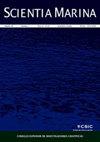种内密度对肉豆蔻幼鱼生长的影响
IF 0.9
4区 生物学
Q4 MARINE & FRESHWATER BIOLOGY
引用次数: 1
摘要
对领土管状建筑属Marphysa(Eunicidae:Polychaete)的需求越来越大,该属在葡萄牙通常被称为“鹅”,用作鱼饵,世界各地都在为此目的进行捕捞。在实验室设施中对种内密度对幼鱼生长的影响进行了为期四个月的研究。三种多毛类密度(低密度,50只蠕虫;中等密度,150只蠕虫;高密度,250只蠕虫)在一个0.25米的水族馆中使用,水族馆中有沙质沉积物和循环水。记录了60%初始种群的总长度、干重和节段数量。还对所有多毛类动物进行了计数,以确定死亡率和通过身体损伤、骨折和再生后段的区域行为。这项研究的结果表明,在所研究的任何密度中,密度对生长率都有显著影响(p<0.001),并且在较低密度下生长率显著较高(p<001)。对于所有密度水平,第一个月的估计日生长率都较高,并随着时间的推移逐渐下降。Marphysa“sp.”幼鱼的高度攻击性和领土行为,高密度下的最高死亡率(35%)和第一个月观察到的低密度下有病变的蠕虫(30%)充分证明了这一点,这表明领土性可能是种群中个体组织和空间安排的主要因素。Marphysa幼鱼可能会争夺洞穴空间。研究结果表明,如果将该物种用于水产养殖生产,则应考虑马鞭藻幼鱼的领地性和攻击性行为。需要进行更多的研究来确定不同发育阶段的密度效应。本文章由计算机程序翻译,如有差异,请以英文原文为准。
Intraspecific density effect on growth of Marphysa “sp.” Juveniles
There is growing demand for the territorial tube-building genus Marphysa (Eunicidae: Polychaete), commonly known in Portugal as “goose”, for use as fishing bait, and it is being harvested all around the world for that purpose. Effects of intraspecific density on juvenile growth were studied over a four-month period in laboratory facilities. Three polychaete densities (low, 50 worms; medium, 150 worms; and high, 250 worms) were used in a 0.25 m aquarium containing sandy sediment and recirculating water. Total length, dry weight and number of segments were recorded for 60% of the initial population. All polychaetes were also counted to determine mortality rate and territorial behaviour through the existence of body lesions and broken and regenerating posterior segments. The results obtained in this study showed that density had a significant effect (p<0.001) on growth rates in any of the densities studied and that growth was significantly higher at lower densities (p<0.001). For all density levels, estimated daily growth was higher in the first month, decreasing progressively over time. The high aggressiveness and territorial behaviour of Marphysa “sp.” juveniles, well evidenced by the highest mortality (35%) under high density and by the presence of worms with lesions under low density (30%) observed in the first month, suggests that territoriality is probably the main factor involved in the organization and spatial arrangements of individuals within a population. Marphysa juveniles probably compete for burrow space. The results reveal that Marphysa juveniles have a very territorial and aggressive behaviour that should be considered if the species is used for aquaculture production. Additional studies are required to determine the density effects for different developmental stages.
求助全文
通过发布文献求助,成功后即可免费获取论文全文。
去求助
来源期刊

Scientia Marina
生物-海洋与淡水生物学
CiteScore
2.10
自引率
0.00%
发文量
21
审稿时长
6-12 weeks
期刊介绍:
Scientia Marina is the successor to Investigación Pesquera, a journal of marine sciences published since 1955 by the Institut de Ciències del Mar de Barcelona (CSIC). Scientia Marina is included in the Science Citation Index since 1998 and publishes original papers, reviews and comments concerning research in the following fields: Marine Biology and Ecology, Fisheries and Fisheries Ecology, Systematics, Faunistics and Marine Biogeography, Physical Oceanography, Chemical Oceanography, and Marine Geology. Emphasis is placed on articles of an interdisciplinary nature and of general interest.
 求助内容:
求助内容: 应助结果提醒方式:
应助结果提醒方式:


